Most people would agree that education is for everyone.
But the truth is, the traditional college model isn’t. Packing into a lecture hall, taking reams of notes, and cramming for exams might not allow you to thrive. And that’s okay!
You don’t have to attend a four-year college to obtain an education and get started on a new career path. If you like to cook, consider culinary school instead. Escoffier can provide students with specialized, hands-on training that allows them to explore new interests and prepare for a future in the culinary arts.
Here are some reasons why culinary school might be right for you.
Get Focused Vocational Training
One of the common complaints about four-year colleges is that the education is largely theoretical. Students often spend hours memorizing facts and concepts to ace a test only for this knowledge to become obsolete once the course is over.
Since culinary school isn’t considered a college, many concepts you can learn are immediately put into practice. After exploring a specific technique, you may hop right into a hands-on cooking assignment. For example, you may spend a few hours exploring the history and flavors of Thai cuisine in the World Cuisines course and then spend the afternoon preparing a fragrant green curry paste.
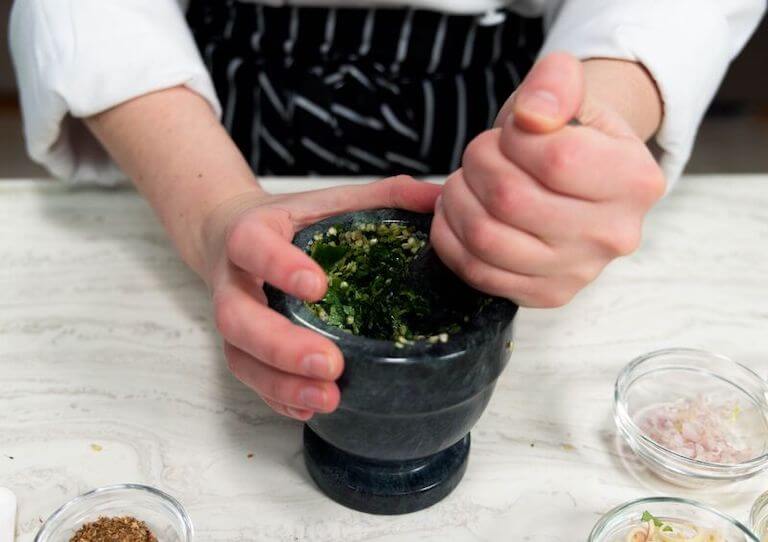
Each Escoffier course is designed to prepare students to begin a career in food. Our Chef Instructors have spent years working in the culinary industry, so they know what knowledge and skills students may need to succeed in a culinary career.
If you’re the type of person who wants to get out of school and into the workforce pronto, culinary school could be for you. At Escoffier, you can complete a diploma program in as little as 30 weeks, or a degree program in just 60 weeks.*** And our online program makes it possible to complete a culinary degree or diploma while simultaneously working in the culinary world–or taking care of other responsibilities.
“You can go get a job in a kitchen now, and do our online program. It’s easier to fit into an industry schedule.”*
Luke Shaffer, Escoffier Chef Instructor
No Irrelevant Coursework
Many students think college will free them from taking courses they’re not interested in. They’re disappointed to learn that a four-year degree includes a list of general education requirements that have no relevance to their career goals.
After all, if you plan to open a restaurant one day, why should you need to take Art History? And if you hope to manage operations at a five-star hotel, do you really need to take Racquetball or Algebra?
At Escoffier, every course is directly related to your future career, whether that’s from a culinary arts degree or diploma, pastry arts, plant-based culinary arts, holistic nutrition and wellness, or hospitality and restaurant operations management. While associate degree programs do include some math, science, and communications requirements, Escoffier has specifically geared those courses toward a career in food.
Instead of a generic math course, Escoffier students may take Foodservice Math & Accounting. Rather than World History, students may take World History & Culture from the Culinary Perspective, highlighting the role of food in history, religion, and politics.
Instead of a science requirement you may never use, you could have the opportunity to study how the body absorbs nutrients, or global nutritional issues.
One of the most popular units with Escoffier culinary arts students is the Farm to Table® Experience. This course can give students an up close and in-person look at sustainability and the local food movement. For six weeks, on-campus students can spend one day per week visiting a farm or artisan maker to learn about food production methods. Online students can get the chance to participate in weekend workshops as well (not required, and not included within the online curriculum.)
Learn on Your Own Schedule
When selecting courses for college, students are provided with hundreds of courses to choose from. Then it’s up to them to choose what they need and fit it into their schedule. If that required English course conflicts with your part-time job, what are you to do?
Students looking for flexibility can attend online culinary school with Escoffier. In around 15-23 hours per week***, you can complete your reading assignments, watch recorded chef demos, take part in discussion boards, attend lessons, and work your way through your cooking assignments.
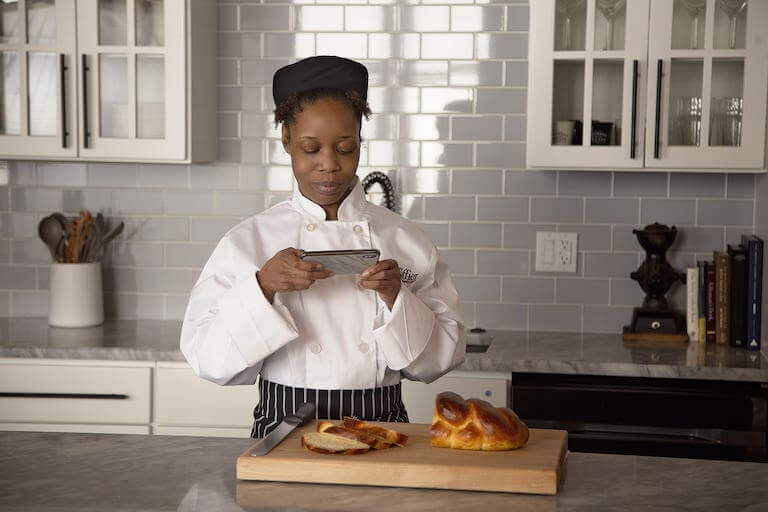
Online culinary school is perfect for students who want to continue working, as well as those who need to spend time taking care of family members. Rather than worrying about communicating with your manager about how you’ll fit your schedule around your classes, you can aim to fit your classes into your current life. As long as they submit assignments on time, online students can complete their coursework in the morning, late at night, or whatever other time suits their schedule.
“I worked 60 hours a week as an employee while simultaneously running my business and keeping up with my personal life while attending this school. Because of the support and grace from the staff along with my determination to finish, I graduated from the culinary arts diploma program and completed my first semester in the associate’s program.”*
Shamaya Williams Coats, Escoffier Online Culinary Arts Student
Plus, students don’t necessarily have to worry about classes being canceled or disrupted since both students and Chef Instructors are in the privacy of their own homes.
Costs of College vs. Culinary School
We know that college is largely theoretical, and some coursework is often irrelevant.
Then there’s the cost. At the time of this writing, the average annual tuition at a public four-year college is $9,750 for in-state students or $27,457 for out-of-state students. And if you have your eye on a private school? Average tuition is $38,768 per year. Take note that these numbers only refer to tuition—students also have to pay for books, fees, room, board, and other living expenses.
That is a huge financial investment for an education that doesn’t always teach actionable skills!
With culinary school, you can complete an online diploma program for much less. Just check out Escoffier’s tuition page. Plus, there are loans, scholarships, and grants available for those who apply and qualify.
Network with Like-Minded Students & Faculty
A college lecture hall isn’t always a great place to meet people with the same interests and goals. Many fellow peers have different majors, students often spend the class sitting in silence and leave as soon as the lecture ends, and professors aren’t always easily accessible.
At culinary school, small class sizes and work groups let students get acquainted and learn from each other. Chef Instructors are right there to help answer questions and share what they’ve learned from their past experiences.
“[I love] seeing the lights come on when a student really grasps something that maybe they were afraid of.”*
Christopher Diehl, Escoffier Chef Instructor
And don’t think online students miss out on connecting with their peers! These students connect with their fellow students through live classroom sessions and class message boards, and they can contact their Chef Instructors with questions or concerns. Plus, Escoffier students who are close to graduating, as well as all of our graduates, have access to the Escoffier Alumni Association. This organization gives them the chance to reconnect with old classmates, meet new graduates, and share tips and employment opportunities.
What you know is important, but who you know can help, too!
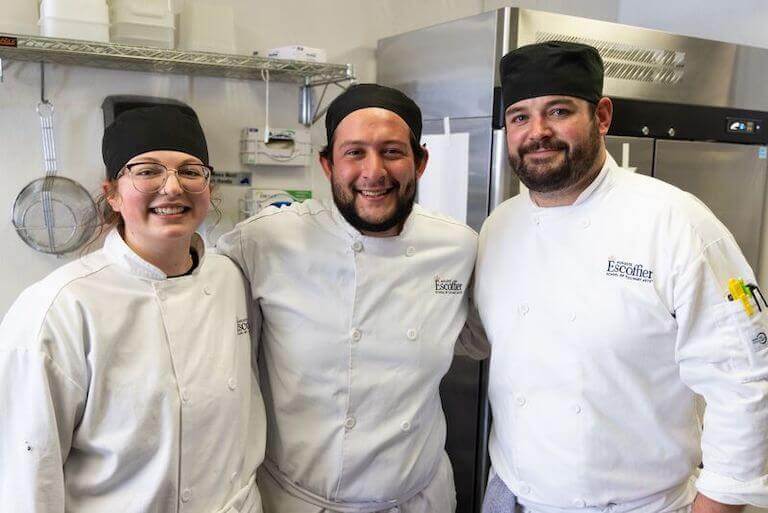
Get Personal Support at Culinary School
Without a support system in place, many students feel like just another face in the crowd at a large college or university. And students just out of high school often have trouble adjusting to a new system with less structure and oversight.
Culinary schools are much smaller and more intimate than many universities or community colleges. This makes it easier for students to connect with others and obtain assistance if they need it.
Every Escoffier student is assigned a Success Coach or an advisor upon enrollment to help them adjust to their new classes and excel in their education. Your Success Coach can work with you to troubleshoot and overcome obstacles that are holding you back in your academic journey. And if you’re struggling with a certain topic in your coursework? Escoffier offers tutoring help to our students.
“I struggled with school in the past for years, but with the help of Career Services and my Success Coaches, I graduated on time. I put a goal in place of getting 95% or higher in each of my baking courses, and I did exactly that.”*
Kellie Trimble, Online Pastry Arts Graduate
Escoffier also offers job search assistance to both current and past students! Our Career Services team can help you discuss career options that fit your goals. And when it’s time to secure your industry externship, a requirement for every Escoffier student, Career Services can help you with your resume, portfolio, and interview prep.
Try a Different Path
No matter your thoughts on a traditional four-year college degree, it’s worth exploring other options. Culinary school can provide a hands-on education and help you enter a new career in as little as 30 weeks!
Contact our admissions department to learn more about culinary school!
Want to learn more about culinary school? Try these articles next:
- Is a Culinary Diploma or Degree Worth It?
- Is Culinary School Considered a College?
- What Every High School Student Should Know About Culinary School
This article was originally published on November 18, 2020, and has since been updated.
*Information may not reflect every student’s experience. Results and outcomes may be based on several factors, such as geographical region or previous experience.
**Consider your situation and resources to determine what is affordable and on budget, for you.
***Approximately 15-23 hours per week is spent on school-related activities depending on program, credential, and personal pace.

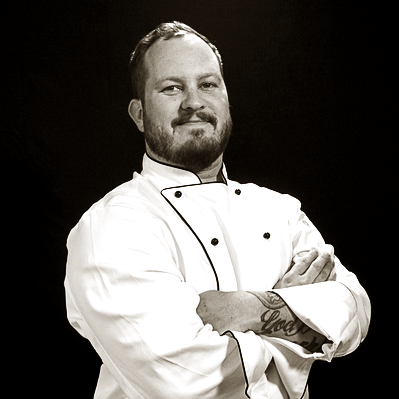 “You can go get a job in a kitchen now, and do our online program. It’s easier to fit into an industry schedule.”*
“You can go get a job in a kitchen now, and do our online program. It’s easier to fit into an industry schedule.”*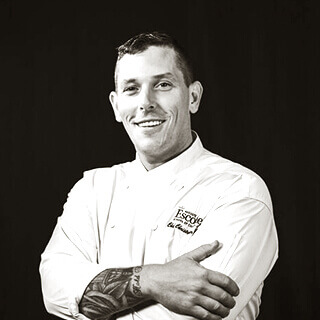 “[I love] seeing the lights come on when a student really grasps something that maybe they were afraid of.”*
“[I love] seeing the lights come on when a student really grasps something that maybe they were afraid of.”*